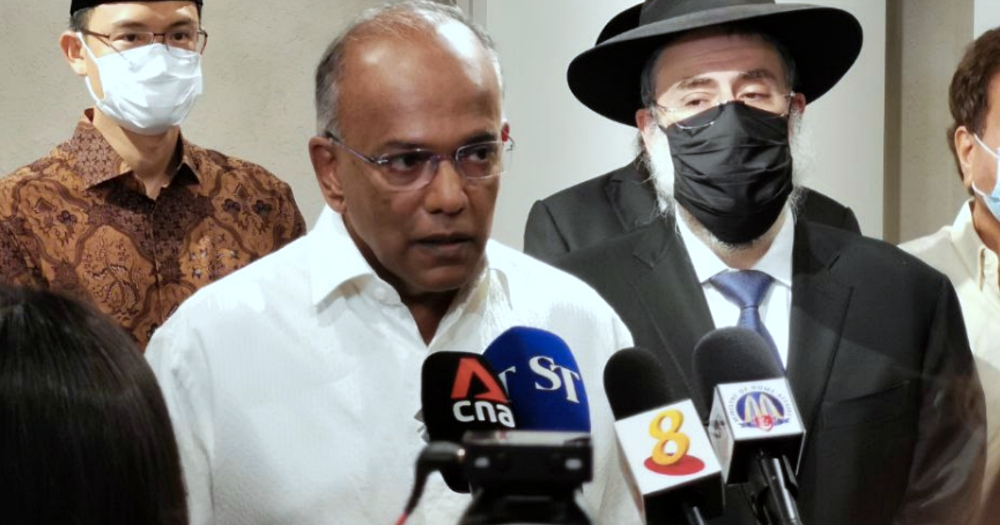A Singaporean, Amirull Ali, 20, was detained under the Internal Security Act (ISA) in March 2021 for planning to carry out a violent attack against members of the Maghain Aboth Synagogue.
He had planned to execute his attack at the Synagogue on a Saturday, after Jewish congregational prayers.
His aim had been to kill three Jewish males in the attack.
Self-radicalisation process
A former full-time national serviceman in the Singapore Armed Forces (SAF), Amirull had first become interested in the Israel-Palestinian conflict in 2014, after viewing a video which showed Palestinian civilians being bombed by Israeli fighter jets.
His support for HAMAS' military wing, the Izz ad-Din al-Qassam Brigades (AQB), began in 2015 after he read a book which glorified the group’s exploits in fighting for Palestinian rights.
He also made plans to join AQB in 2018, to fight against Israel, and was told that he would become a martyr if he were to die fighting against the enemies of Islam on the battlefield.
First self-radicalised S'porean driven by the conflict
Law and Home Affairs Minister K. Shanmugam said at an interview with the media on Mar. 10, that Amirull is the first self-radicalised Singaporean picked up by the Internal Security Department (ISD), who was primarily driven by the Israel-Palestinian conflict.
Shanmugam emphasised that Amirull was detained not because he sympathised with the cause, but because he had subsequently planned to harm and kill innocent people in Singapore.
Amirull had downloaded a diagram of the human vascular system and identified the mid-section as the best area to stab his intended victims to inflict a quick death from massive bleeding.
He had also made at least two physical reconnaissance trips to the Synagogue, and planned his escape route after the attack, following which he had intended to return home to post a short manifesto online.
Additionally, he had been serious about travelling to Gaza to take up arms with AQB, and even engaged in discussions with a foreign contact to do so.
Condemned the premeditated act of violence
He added that while individuals in Singapore are entitled to support their causes, what one cannot do is to take up armed weapons with the intention to kill or harm members of another community or religion.
Said Shanmugam:
"It's okay to support the cause but not okay to go around killing people."
Shanmugam also said that if Amirull had succeeded in his attack, the consequences would have been severe, going beyond the loss of three lives, and instead potentially inciting greater animosity and distrust between different races.
He added that a "very quick period for radicalisation" was one of the challenges for ISD.
He also called for Singaporeans to remain vigilant, as radicalisation remained an "ever present risk" that needed the attention and alertness of various communities in Singapore.
More security measures might be needed
The arrest comes about a month after another Singaporean youth was detained by ISA in January – for planning to conduct terrorist attacks against Muslims.
When asked if more security would be placed at such religious sites, Shanmugam said:
"When you walk into a synagogue or a church or a temple or a mosque, how would you feel if the place looks like a fortress, a cantonment, with armed guards patrolling it? Is that how we want to turn our places of worship into? I think there needs to be some level of security, depending on the perception of threat.
There may have to be some guards inside, but I think we need to be very, very careful how we do it. Otherwise, places of worship won't look or feel like places of worship.
The young man a few weeks ago, wanted to attack a mosque. Imagine if you turned all mosques into fortresses, how would it feel? So, it's a balance. You're absolutely right, because they are targeting religious sites, because people very often come in with an open mind and open heart.
I think the security measures may have to be stepped up a bit to balance off the risks that are increasing. I can't give you a definite answer for the future.
It has to depend on how the threats evolve. But, my own sense is that not all religious sites will have to be protected to the same level. Some face a higher threat level, and they may have to take some additional measures."
Related story
Top image via Mothership
If you like what you read, follow us on Facebook, Instagram, Twitter and Telegram to get the latest updates.
